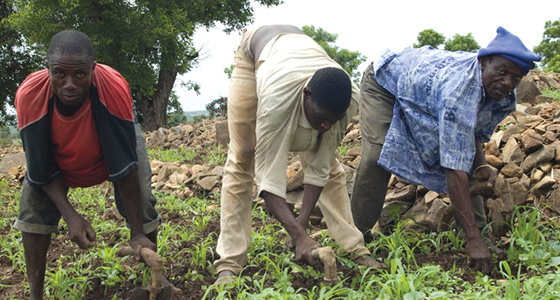 Smallholder farmers and actors in the root and tuber crop production value chain in the country will benefit from a €5 million European Union-funded programme that seeks to create a sustainable link between growers and buyers within the sub-sector while empowering them to increase income, create more employment and improve food security.
Smallholder farmers and actors in the root and tuber crop production value chain in the country will benefit from a €5 million European Union-funded programme that seeks to create a sustainable link between growers and buyers within the sub-sector while empowering them to increase income, create more employment and improve food security.
This follows the launch of a project titled “Strengthening Linkages between Small Actors and Buyers in the Root and Tubers Sector of Africa”, a four-year programme aimed at increasing the production and market accessibility of cassava, coco-yam, sweet potatoes and yam –which are important staple food crops in African, Caribbean and Pacific countries.
In Ghana the “Root and Tuber Programme” is in line with the broader national objective of modernising agriculture, which is a key component of economic development, and it is targetted at small and medium-sized agro-businesses, farmers, retailers and other small actors along the chain.
The programme will be implemented in six other West African countries and ensure regional market integration for root and tuber crops, improve sector actors’ access to finance and climate risk management tools, while advising beneficiaries on viable inclusive business models.
Food and Agriculture Minister, Fifi Kwetey, who launched the programme in Accra commended the FAO for securing the facility as it will make smallholders farmers in the sector more competitive to employ more hands on their farms, and ultimately help in the reduction of poverty in rural communities.
He said the production of staple crops, especially cassava, when given the necessary attention and support will be the key to the country’s economic transformation, and called on the various individuals associated with the programme to commit their expertise and time to ensure its success.
“Root and tuber crops are staple foods that are grown and consumed in all parts of the country; they serve as a primary source of income to farmers in rural communities, and so this programme will be very beneficial to actors in the sector.
“As a ministry, we are poised to modernise agriculture to make it more attractive as a way of reducing poverty in the country. We need more of such private sector interventions in the agribusiness sector in order to gain exponential results just as we see in the telecoms and other economic sectors,” he said.
Mr. Kwetey acknowledged the continued support of the FAO in the provision of technical assistance and capacity building programmes toward the goal of improved food security and improved livelihoods for the various sector actors.
FAO’s Country Representative to Ghana, Dr. Lamourdia Thiombiano, said cassava has become a multi-purpose crop that responds to food system priorities of developing countries, trends in the global economy and the challenges of climate change, and that it has the potential to reduce rural and urban poverty while closing the food security gap.
He said government must recognise the huge potential of cassava in terms of spurring rural industrial development, and that the new programme is part of the FAO’s regional poverty reduction initiative aimed at empowering smallholder actors to generate more income and create more employment.
He said the FAO will continue to support government in its efforts at developing the cassava value chain, agro-processing, rural marketing enterprises and industries, and in promoting rural employment for the youth in agriculture.
Ghana is the third-largest cassava producer in Africa, with incomes from production and processing accounting for about one-fifth of the national agricultural Gross Domestic Product (GDP).
Presently, it is Africa’s second-most important staple food in terms of per capita calories consumed. It is projected that by 2020, over 60 percent of global cassava production will be in Africa within a context of fast-growing population — making it an accessible and favoured source of carbohydrates and serving as a food security crop.
Source: B&FT Online























